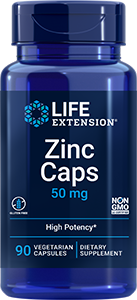
Vitamin C and Zinc: Should You Take Them Together?
Published: February 2024
Vitamin C and zinc are two of the most familiar dietary supplement ingredients for immune support (although that's just the tip of the iceberg when it comes to their benefits). Given that there are good amounts of vitamin C and zinc in a healthy, balanced, plant-rich diet (think Mediterranean diet!), maybe you're wondering why it's worthwhile to supplement with these nutrients?
Well, for one thing, while it's not hard to find foods with vitamin C and zinc, getting adequate quantities is a challenge. You can get some vitamin C (scientifically known as ascorbic acid) from citrus fruits like oranges, mandarins and grapefruit (and of course their juices), but you'd have to be a real citrus hound to get enough vitamin C intake to keep your immune system in tip-top shape.
And unless you're a regular consumer of oysters, beef, crab, and turkey, you may be surprised how little zinc you are getting. (Heads up, vegans: soy, cashews, and pine nuts are some of your best zinc foods—but again, you're not going to hit that RDA with pesto sauce.)
Of course, that's where utilizing the convenience and power of a vitamin C supplement (we'll get to the value of taking a zinc supplement in a moment) can make a difference and help supercharge your immune function—and your nutrition. Taking dietary supplements can be a lot simpler than people sometimes think, because nowadays we have choices about taking a tablet, a gummy, a capsule or a powder.
Let's dive right in and talk about what vitamin C plus zinc can do for your immune health. And, we'll answer the question: Should you take vitamin C and zinc together?
What does vitamin C do for you?
Wow, where do we start?! It's almost easier to answer what it doesn't do for you. OK, let's not go there, because this antioxidant won't fold your laundry, do your dishes or pick the kids up from daycare. But it is of major importance for your body and immune system to function properly and to be healthy, especially in fall and winter.
First off, vitamin C is essential (all vitamins are essential, actually: that's the very definition of a vitamin) to your whole-body health. And we really mean your whole body, because vitamin C is necessary for you to make collagen. And collagen is the structural protein that holds your body together, kind of like cement. There's collagen in your bones, skin, and organs—it's nearly everywhere.
But that's not all. Vitamin C is an antioxidant, which means it protects your body from potentially harmful free radicals that can slow things down. And this vitamin also helps your body make critical stress hormones, which could be one of the reasons it's so important for immune function. After all, winter and the holidays can be pretty overwhelming (physically and sometimes emotionally), which can tax your vitamin C levels. That in turn can cause your natural defenses to be less, well, defensive!
A vital point here: Unlike fat-soluble vitamin D (another immune super nutrient!), your body doesn't store vitamin C, even if you take a high dose. So a week or two without citrus or other fresh fruit and vegetable sources of vitamin C (we're looking at you, kiwi, strawberries, broccoli, and tomato juice) and you'd be running quite low on vitamin C, if you didn't have another good source.
So relying on a vitamin C gummy or two (or a tablet or capsule or powder or whatever you prefer) every day is a pretty convenient and affordable type of immune support and health "insurance."
What does zinc do for your immune system?
Whereas vitamin C is a vitamin (you'd probably figured that out already), zinc is a mineral that is essential for human nutrition. Zinc is also a key player in immune support, and like vitamin C it can be taken as a dietary supplement in tablet or capsule form, though if you haven't heard about the wonder of zinc lozenges before, they are a great option. Some brands offer zinc as a gummy, but a peppermint zinc lozenge has the added benefit of coating sensitive throat tissue with zinc, resulting in a more rapid delivery. But zinc tablets are also a great option.
Can you take vitamin C and zinc together?
Yes! One popular way to get these two immune health super allies together is to take them as a part of a precision-designed combination containing multiple-nutrient ingredients like vitamin D3, zinc, vitamin C and other supportive nutrients, in case the idea of separate capsules or tablets is tiresome for you. A combination vitamin pack is convenient, and of course they are working in harmony anyway. And fortunately, there are high-quality dietary supplements that are certified to be gluten-free and often are non-GMO, too!
Looking for a deeper dive into personalized recommendations for immune support supplements? Take our immune supplement quiz!
How to get vitamin C naturally
For food sources of vitamin C, think produce aisle. Green leafy veggies, cruciferous veggies like broccoli and brussels sprouts, and of course citrus too. Basically, if you eat a diet with good amounts of fresh fruits and veggies, you'll probably hit the minimal amount necessary for daily nutrition. Possibly more if your diet is rich in plants.
However, it's important to remember that too much cooking, especially for too long or at too high of a temperature, can reduce the amount of vitamins in food. On the other hand, cooking makes it hard to digest fiber, making it harder for your digestive tract to get at the nutrients inside.
For that reason, we suggest not worrying too much about raw versus cooked, and just try for the healthiest diet you can. But, for optimal intake, a vitamin C supplement is a nice insurance policy. Our body knows what ascorbic acid is, after all, and uses it the right way, whether you get it from food, tablets or powder.
How to get your fill of this vitamin is something you can decide based on personal preference and convenience, whether it's by eating vitamin C-rich sources, supplementing, or a combo of both. As long as you get enough intake of vitamin C at the recommended dose on a regular basis, you'll be fine.
What's the best way to get zinc?
Zinc is a mineral and can't be destroyed by heat. Certainly not by cooking anyway. Zinc is in a wide variety of foods, so a varied diet is your best bet if you're aiming to get your zinc from diet only. While it's possible for a plant-based diet to supply adequate amounts of zinc, seafoods and meat are quite high in it, with oysters being the headliner as the richest source.
On the other hand—we already said this, but it deserves emphasis—the vitamins and minerals in dietary supplements are the same as those found in foods. Your cells use the vitamin C and zinc from your gummy, tablet, or multinutrient formula the same way as if it ultimately came from an orange or an oyster. If you can find a formula that includes some elderberry too, that's a plant nutrient that is famous for providing immune support and seasonal wellness.
How much vitamin C should I take?
The old idea of taking a really high dosage every hour or two for immune health turns out to have been misguided. Why? Because a high dose doesn't result in really high vitamin C levels. Your body places a tight limit on how much vitamin C can be absorbed and used, whatever form it comes in.
But there's great news on that front because highly absorbable vitamin C supplements overcome that problem. Specifically, liposomal vitamin C is very well absorbed, results in higher vitamin C levels than taking plain ascorbic acid, and stays in your system for up to 24 hours—whereas regular vitamin C gets eliminated fairly rapidly.
But liposomal vitamin C is far from your only option. Vitamin C is often available combined with bioflavonoids, powerful biomolecules that pack an antioxidant punch. And since citrus peel is a great source of bioflavonoids, it's more like getting a whole healthy orange or grapefruit. Innovative formulas have combined a highly bioavailable form of the bioflavonoid quercetin (now there's a mouthful) with ascorbic acid. Look for 500 to 1,000 milligrams of vitamin C per dose.
For those of you keeping track at home, 1,000 milligrams equals one gram. You can also find ascorbyl palmitate, a formulation of vitamin C that is meant to be fat soluble.
You can also get C in powdered form. One example of this is buffered vitamin C, which protects against acidity and is a good choice for sensitive stomachs.
What is the best way to take zinc?
Just as there are multiple ways to take vitamin C, you have options with zinc (both of which, by the way, are immune support nutrients that have been proven to work together in a complementary fashion). For instance, zinc lozenges are known to be more "fast-acting" as immune support aids than tablets, capsules, gummies or powder. This may be because when you suck on a zinc lozenge, the essential mineral is getting exactly where it needs to in your body.
A popular dose for zinc capsules is a 50 milligram capsule, taken once per day with food. Look for zinc monomethionine and/or zinc citrate. For the rapid, local effect of zinc lozenges, they often come with 18.75 mg per lozenge of zinc oxide, gluconate, or acetate.
How to take vitamin C and zinc
Generally, it's best to take nutrients like vitamin C and zinc with food. This minimizes any chance they could cause digestive discomfort, which is especially a concern for some people when taking zinc. Zinc lozenges are sometimes taken frequently for short periods of time, without concern for an empty stomach or not, to address immune challenges.
The best advice on how to take these immune powerhouses is to make sure you're getting plenty of them in the fall and winter months when the environment throws a lot of immune stuff our way.
Pro tip: it can be hard to get all the right citrus and other fruits, and fresh vegetables, and take a vitamin C supplement and a zinc supplement—it requires a lot of planning and supplement swallowing! Many savvy dietary supplement takers and proactive health aficionados instead opt for a multinutrient formula with a range of important ingredients that target immune system optimization. You can also choose formulas that focus on supporting overall whole-body wellness.
What happens if you take vitamin C and zinc every day?
It's pretty simple. Compared to someone who doesn't get enough vitamin C or who never partakes in zinc supplementation, you'll have more immune support at your disposal. You very well might have a little more spring in your step, better energy, a more cheerful disposition, and dare we say some more twinkle in your eye—not because you're taking these vitamins necessarily, but the peace of mind and absence of downtime should give anyone a reason to smile!
But seriously, when facing the immune challenges that fall and winter bring, taking vitamin C and zinc every day is just a smart move. And since you can take them as part of a multinutrient combination that also delivers vitamin D and other essentials, it's easy, too.
References
- Maggini S, et al. "A combination of high-dose vitamin C plus zinc for the common cold." J Int Med Res. 2012. https://pubmed.ncbi.nlm.nih.gov/22429343/
- Wintergerst ES, et al. "Immune-enhancing role of vitamin C and zinc and effect on clinical conditions." Ann Nutr Metab. 2006. https://pubmed.ncbi.nlm.nih.gov/16373990/
- "Vitamin C." Data on file.
- "Vitamin C." National Institutes of Health. March 2021. https://ods.od.nih.gov/factsheets/VitaminC-Consumer/
- "Zinc." National Institutes of Health. September 2022. https://ods.od.nih.gov/factsheets/Zinc-HealthProfessional/#h3
Like what you read?
Please subscribe to get email updates on this blog.









